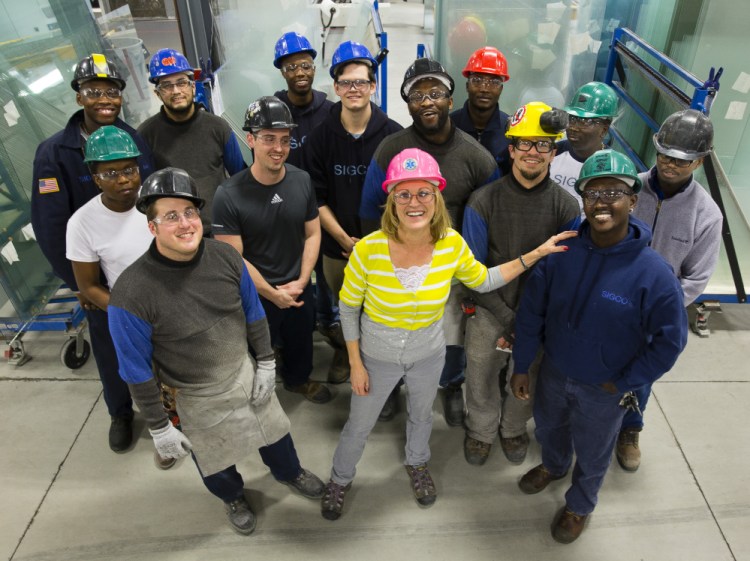Like many companies in southern Maine, Sigco has been struggling to find workers. The Westbrook metal and glass fabricator has been growing – it has more than 200 employees and sales of $50 million a year – but finding workers when the state’s unemployment rate has fallen well below 4 percent a year is tough. Sigco is addressing the issue in an unusual way: Working with the Portland adult education system, the company is recruiting workers from the ranks of those who have sought asylum in Maine, primarily from Africa and Vietnam. Cindy Caplice, the company’s human resources manager, explained how the program works and its impact on Sigco.
Q: Why did Sigco start this program?
A: Like everyone in Maine, we’ve been desperately looking for good employees who want to work. We reached out to Portland adult education and they have been incredibly supportive of a partnership with us. They are teaching prospective employees how to read a tape measure (in inches, rather than centimeters) and working on English comprehension because that tends to make them more successful here. We have a number of African-Americans who have been with us for four years and one was just promoted to team leader. They’re engaged, they want to work, to learn, to grow and to support their families. They don’t want public assistance and many, as soon as they get a work permit, they’re looking for work.
Q: How would you say the program is working?
A: Great. They have a positive attitude and are appreciative for the opportunity. These are jobs with starting wages of $13 or $14 or $15 an hour. They’re willing to learn – and it’s on-the-job-training all the time.
Q: How do you feel about the anti-immigrant talk we’re hearing, especially in the presidential race?
A: Disappointment. There’s good and bad in every population and to make blanket statements is unfair and unfounded. Let’s concentrate on those who are succeeding. For instance, we have a cutter from Burundi who’s taking a calculus course to improve his skills We have tuition reimbursement and good benefits. These are things people want when they’re seeking a better life for themselves and their families.
Q: Is there more red tape when you hire immigrants?
A: There’s not any more paperwork involved. You still have to get all your documents, but many of our employees have drivers’ licenses and Social Security cards. You have to get proper work permitting, which you’re required to do for any employee.
Q: Does the program fill all of your workforce needs?
A: No, we’re still recruiting and interviewing every day. With the growth of the company, we’re still looking for workers.
Q: Is turnover different among immigrant workers?
A: I’d like to believe that retention has been better. As I said, they’re very loyal and appreciative. I’m not saying (native) Mainers aren’t, but it seems like the turnover is lower among our immigrant population.
Q: What’s the future of the program?
A: I only see it getting stronger.
Q: Why immigrants and not other groups that are struggling, such as millworkers whose plants have shut down?
A: If the millworkers would move here, we’d love to (hire them). We’re advertising all the time and have our positions listed in the jobs bank. But it’s the immigrants who hear about us. They’re on our doorstep all the time. The challenges for some of the millworkers are location and the lack of affordable housing.
Q: What about transportation for your immigrant workers?
A: In the Greater Portland area, it’s a challenge. We have departments that start at 4 and 5 a.m. and the second shift starts in the afternoon and can go to 1 and 2 a.m. They carpool or take a cab.
Copy the Story LinkSend questions/comments to the editors.




Success. Please wait for the page to reload. If the page does not reload within 5 seconds, please refresh the page.
Enter your email and password to access comments.
Hi, to comment on stories you must . This profile is in addition to your subscription and website login.
Already have a commenting profile? .
Invalid username/password.
Please check your email to confirm and complete your registration.
Only subscribers are eligible to post comments. Please subscribe or login first for digital access. Here’s why.
Use the form below to reset your password. When you've submitted your account email, we will send an email with a reset code.